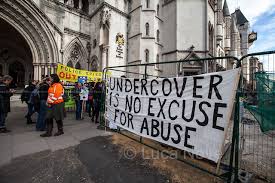
Police Spies Out of Lives has made the following call out: “On April 5th & 6th, there is an Inquiry hearing resulting from the latest police delaying and avoidance tactics, applying to delay the Inquiry further, and to restrict the scope of the Inquiry.”
We demand that the Inquiry starts to serve the people who have been affected by undercover policing, and does not allow the abusers to get away with delaying and denying disclosure on what has happened.
We demand that the Inquiry release the cover names of the officers now, so that the full extent of the undercover policing scandal can be revealed. We demand the release of the files held on all the core participants affected by undercover policing.
It is public pressure and outrage that brought about this Inquiry. Right now we need to show that it is still high on our agenda to prevent the police hiding the truth any further. All people involved with campaigning for progressive change in our society have been and are at risk of infiltration and abuse at the hands of these shady political policing units.
It is people like you, taking a stand for your right to campaign for positive change without being abused by the state, that will change history, making sure these abuses come to light and are prevented from ever happening again. Without public support, the police may get away with hiding what has happened, and be able to continue their abuses.
Background
The police’s latest delaying tactic will be the subject of a two day hearing beginning on Wednesday 5th April. After failing to win approval for its nonsense Neither Confirm Nor Deny non-policy, the Met will argue the deadline on restriction orders should be extended to 1 October 2017. But even that isn’t enough for them; they are now saying some former spycops should be excluded from the inquiry altogether.
Restriction orders refers to applications to keep undercover officers identities and details of their deployments secret. This means non-police and non-state core participants would be unable to learn anything about those who spied on them. It also means those who suspect they were targeted would not have the information necessary in order to apply to join the inquiry.
The inquiry had ordered the Met to provide anonymity applications for all Special Demonstrations Squad officers by 1 March 2017, having already extended the deadline several times. The Met argues that the workload of sifting through documents, preparing risk assessments and medical evidence and drawing up anonymity applications is too onerous to be competed by March 2017 and even October 2017 is ambitious.
In progress briefing of 3 March 2017, Police Spies Out of Lives comments: “They do not give any proper explanation of why this was not considered earlier, what alternative arrangements could be put in place, what other resources could be used or why it is not possible to start at the beginning and work through with the earliest deployments being dealt with at the start. It is likely that any risk to an officer deployed undercover in the 1960s and 1970s will be very low, given that they will have retired long ago.”
But the Met goes even further. It wants some officers to be made exempt from applying altogether. In other words they would not be part of the inquiry. It’s lawyer believes that “a number of deployments will be properly subjected to a close scrutiny by the inquiry in meeting its terms of reference. This does not mean, however that each deployment will need to be subjected to the same depth of review.” Therefore application orders would be needed only for those undercovers who Pitchford ““wishes to subject to more considered scrutiny”.
Leave a Reply